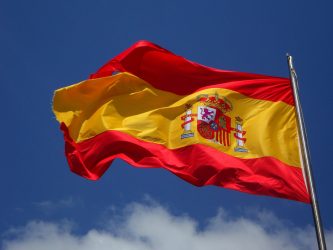 Spain’s Royal Decree on the Commercial Communications of Gambling Activities entered into force yesterday (3 November), a development that operator association Jdigital has attacked as likely to have “dire consequences” for player protection.
Spain’s Royal Decree on the Commercial Communications of Gambling Activities entered into force yesterday (3 November), a development that operator association Jdigital has attacked as likely to have “dire consequences” for player protection.
The regulations look to significantly reduce minors’ exposure to gambling advertising, by banning sponsorship deals with operators. Existing deals will be allowed to continue until the end of the current Spanish football season, per a communication from Minister of Consumer Affairs Alberto Garzón to clubs last week.
Advertising on TV and radio will be restricted to the hours of 1am to 5am, a measure that extends to videos on YouTube, while on other social channels operators will only be permitted to share ads with their followers.
Age gating must also be used online, to further reduce minors’ exposure to gambling.
Promotional bonuses are also prohibited under the new measures, though operators will be able to target registered, verified customers with special offers.
The measures were first published in February this year, with an exception to the TV and radio rules for sports broadcasts. In this set of rules, bonusing and sports sponsorship were also permitted.
However, in July the proposed rules were amended, to adopt a number of measures initially only introduced temporarily to protect players during the novel coronavirus (Covid-19) pandemic.
The rules have been introduced with the government claiming that gambling advertising spend had tripled in the past four years, alongside an increase in gambling among people between 18 and 25 years old. In 2017, the government said, 28% of new players came from this demographic, increasing to 40% of new customers by 2019.
Garzón has also claimed that Spain is just the first in a host of European countries looking to tighten controls on gambling marketing, amid concerns over a sector he claims is being built “on the backs of very vulnerable groups”.
However it has been consistently attacked by the industry as disproportionate and guided by political beliefs rather than evidence of harm by bodies such as the European Gaming and Betting Association (EGBA).
In the wake of the Royal Decree’s entry into force, Jdigital, an industry association which counts more than 80% of Spain’s igaming licensees among its members, said the measures would lead to an increase in illegal gambling.
“[We] are afraid that the regulation proposed by the Ministry of Consumer Affairs may have the opposite effect to that intended since it implies such a disproportionate restriction of the advertising activity of legal operators that it is comparable, in practice, to a prohibition,” it said.
“This will mean, as has happened in other countries where similar measures were adopted, the foreseeable increase in the activity of unlicensed operators, which will have dire consequences in terms of the protection of vulnerable groups.”
It said that the industry had long been welcoming of regulation, something evidenced by a voluntary code of conduct for Jdigital members that came into force from January this year. Jdigital’s members had also complied with pan-European standards coordinated by EGBA, it added.
The government, it continued, could also be seen as guilty of hypocrisy. While it restricted online gambling advertising, state lotteries Organización Nacional de Ciegos Españoles (ONCE) and Sociedad Estatal Loterías y Apuestas del Estado (SELAE) were allowed to ramp up activity.
ONCE, Jdigital pointed out, was the tenth largest spender on advertising in 2019, while SELAE’s branding would appear on LaLiga coverage on the state-owned broadcaster Corporación de Radio y Televisión Española (RTVE).
Furthermore ONCE advertised during hours when minors were likely to watched, and SELAE continued to use advertising to suggest that gambling could change players’ lives – something strictly prohibited for online operators.
The association added that there was little evidence of gambling harm that needed addressed by new controls, pointing out that Garzón himself had said the government did not have the data to back up its claims. It also highlighted studies which claimed Spain’s problem gambling rates was in fact one of the lowest among regulated gambling jurisdictions.
“In short, at Jdigital we consider that the Royal Decree on Commercial Communications of Gambling Activities approved today by the Council of Ministers is discriminatory, unfair and disproportionate,” it said. “[Especially] in a market in which online gambling is a legal activity and already highly regulated and where the incidence rate of problem gambling has remained stable at 0.3% of the population between 15 and 65 years of age since 2015, being one of the lowest in Europe[…].”












